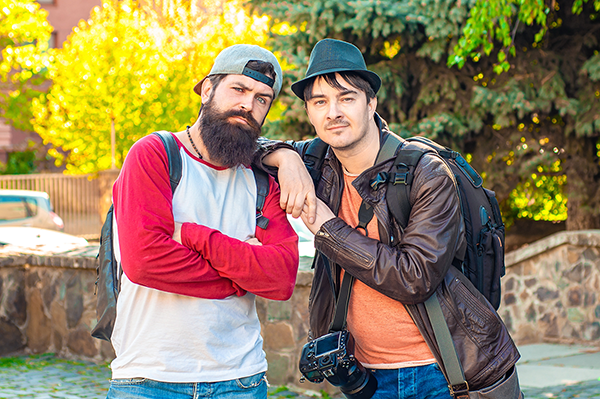
Canadian Immigrant Overcomes Detention In Four States To Win Legal Residency
For many immigrants, immigration jail is the twilight zone of immigration law.
Like Ben, a twenty-year old Canadian immigrant.
A few days after his younger brother Warren was arrested, Ben decided to visit him. Warren, like Ben, was born in Canada, and they had entered the U.S. at the same time. They lived together with their parents.
Warren was a lawful permanent resident. Ben did not have a green card.
Their father had somehow neglected to file Ben’s paperwork.
This simple mistake would have enormous legal and financial consequences.
Upon Ben’s entry, security guards discovered his lack of a permanent resident card. They apprehended him. They contacted ICE and turned him over to immigration agents.
Shortly afterward ICE agents took him to a detention facility in San Diego. Two days later, ICE moved him to a facility in El Centro, California – about 175 miles away from his home. His family was not notified. His family could not find out where Ben had been taken.
Ben’s parents came to our San Diego immigration attorney office. After a long discussion, they hired Carlos to represent Ben. .
They asked us to locate Ben. They wanted to help him get out of immigration jail.
Ben had no convictions. He worked working part-time as a carpenter. Engaged to his high school sweetheart, a U.S. citizen, his wedding was only a few months away.
In Carlos’ opinion, Ben qualified for release upon the posting of an immigration bond. A green card lawyer, based on information provided by his parents, Carlos knew Ben could qualify for permanent resident status.
He would need our help to protect against deportation in immigration court proceedings.
First, our office had to locate him.
This was not a simple task. After a few days of research, we found the answer. For a few days, Ben was in El Centro. But ICE had transferred him to somewhere in Arizona. Within another day, we were able to confirm Ben’s Arizona location. We also learned his bond for release was set at $20,000.
Carlos explained to Ben’s family that even though he was considered an undocumented Canadian immigrant, the bond seemed excessive. He recommended trying to lower the amount. He also suggested moving the case back to San Diego. They agreed with Carlos’ plans.
He prepared to visit Ben in Arizona. Meanwhile, ICE transferred Ben again.
Our office had to begin the searching process once more. Find Ben. Then schedule a deportation and removal bond hearing.
This time the case had moved to El Paso, Texas. Ben was detained six hours away – at a jail in Albuquerque, New Mexico.
The government attorney asserted Ben was not allowed to post any bond. He told Carlos that he would oppose our bond request under the immigration rules for Texas. Ben would have to stay in a New Mexico facility while his case went forward in Texas.
Carlos began immediate work on a back-up plan. To offset the impact of an adverse ruling, Carlos started to prepare an immigration appeal. In case of defeat, he wanted to reassure Ben and minimize his feelings of despair before leaving back to California.
We set the bond hearing for a Monday. This would give Carlos enough time to visit over the weekend and get Ben ready for the questioning he would likely face at court. He knew that Ben’s testimony was critical to success.
Upon arrival at the New Mexico jail on Friday evening, instructions had changed. The warden had enforced a “No Visitors” policy for the weekend. Officers said it did not matter that Carlos’ visit had been approved in advance.
The warden’s policy was unacceptable.
To improve Ben’s chance for a favorable outcome, Carlos needed time to prepare Ben.
He refused to go along with the change in his visitation plans. For several hours, Carlos went back and forth with the facility officials. Finally, the warden decided to meet one-on-one with Carlos. After their meeting, the warden approved a short early morning visit for Sunday.
After ensuring Ben grasped the ins and outs of the upcoming hearing, Carlos flew to Texas, where he would meet Ben in court.
The next morning went as planned. Ben’s testimony was clear and concise. Carlos challenged the government’s “no bond” position based on Texas immigration law.
But that was not the end of Ben’s problems.
Before ruling on Ben’s case, the judge threw yet another curve. He requested to hear directly from Ben’s fiance and parents. He wanted to probe into the circumstances of Ben’s Canadian immigrant status.
Carlos was not derailed. He had anticipated this unusual condition.
Since they were living in Carlsbad, we already had them on standby at our Escondido office. We scheduled the telephone conference with the judge for that same afternoon.
After hearing from everyone, the judge ruled.
Finally, Ben prevailed. His four-state detention odyssey had ended.
The Texas judge set Ben’s bond at $2,500. A few days later, Ben returned home. His case was transferred to San Diego.
Soon after Ben’s return, Ben and Carlos started getting ready for Ben’s future court hearings.
About a year later, Ben won his trial. He was granted permanent resident status.
Ben is now a United States citizen and happily married. He has two children and works as a full-time carpenter.
No matter how difficult the road ahead may seem, do not give up without exploring all your options. This series of immigrant success stories is dedicated to those who refuse to stop believing that some day, somehow, victory will be theirs.
This article about permanent residence and deportation defense is Example Number 2 on the different types of challenges and obstacles which immigration lawyer Carlos Batara has helped immigrants overcome.
Previous: Successful Survival From A Nearly Disastrous Misunderstanding
Ready to take a serious and honest look at the strengths and weaknesses of your immigration case? Let’s get started with a personalized strategy and planning consultation . . .





